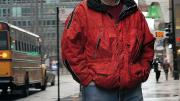On weeknights and Saturdays during tax season, Robert Burke, M.B.A. ’99, and his Ladder Up volunteers can be found at work throughout the Chicago area, helping low-income families keep as much of their income as possible. Ladder Up’s free financial services educate clients about tax credits and aid for higher education; the nonprofit (www.goladderup.org), which Burke founded in 1994 and still chairs, estimates saving clients an average of $150 in fees typically charged by commercial firms, and often more. In its first year, Ladder Up returned $150,000 to the community it served. Since then, some 16,000 volunteers have helped return more than $147 million to 84,000 families.
Filing taxes “is a daunting task, and the system isn’t getting less complicated,” says Burke. Volunteers from more than 250 local companies, including banks and law and accounting firms, work with low-wage earners accustomed to relying on check-cashing and money-wiring services that charge more than traditional banks. Volunteers need only a “sharp mind and sharp pencil,” says Burke, not an accounting degree; they are trained to maximize clients’ tax credits, sometimes with life-changing results. (One woman discovered the IRS owed her $10,000.) To find clients, Ladder Up partners with community groups—churches, schools, YMCAs—that provide space or publicity.
Burke, who now works in private equity, began Ladder Up as a 22-year-old employee at Arthur Andersen; he wanted to assist the families of the children he coached in basketball on Chicago’s West Side. He wrote a business plan and approached his managers, explaining that his colleagues would become “better people and business professionals” if they learned how to serve an entirely new population: the working poor. Both company and employees responded enthusiastically. Fourteen years later, Ladder Up offers its clients classes on financial literacy as well. “You’re amazed at the courage of those you’re trying to help,” Burke says. “They’re doing so much with so little. What we try to do as an organization is put more tools in their toolbox.”








